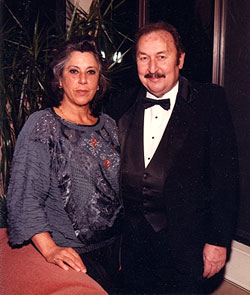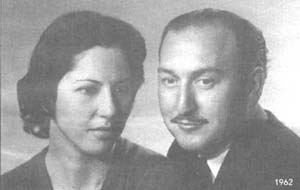 |
 |
 |
 |
 |
 |
 |
 |
|
 |
 |
 The
Creation of the Magnes Museum
The
Creation of the Magnes Museum
(Written
in 1987 to celebrate the 25th anniversary of the Judah L. Magnes
Museum)
By Rebecca Camhi Fromer, Co-founder of the Magnes Museum
|
| |
|
|
To the outward world the war was over, but to me, the awesome facts
of human depravity in ordinary men remain like a brand that is forever
seared into consciousness. They are a goad and a spark to a largeness
of kinship, and they extend to all those who strive to be unfettered
and unmurdered, for we now know with absolute certainty that slaughter
may be as prosaic or subtle as it is rationalized, seductive, and
mechanized. Our age has learned it cannot circumvent the fact that
entire nations are not only capable of genocide, but also culpable
in embracing it within their daily lives in acts of pathetically
natural accommodation.
I write
as I do because the holocaust, which some doubt, suppress, forget
or banalize, and others remember but cannot encompass, was the dominant
strain which led to the creation of the Magnes Museum. Something
deep, with neither voice nor choice, had entered the realm of absolute
knowing and assumed the value of a vow, and that vow carried within
it the conviction to remember, even as It refused to suffer or grieve
or accept sorrow as an everlasting epitaph for the Jew. Before the
ashes there was life, and that life would be celebrated, and, perhaps,
if we were lucky or meritorious or both, the act of celebration
would constitute restoration of the name and serve to sanctify it.
|
|
 Rebecca
and Seymour Fromer in 1997.
Rebecca
and Seymour Fromer in 1997.
|
| |
|
|
|
|
|
| |
|
|
 Magnes
Museum founders Rebecca and Seymour Fromer (1962).
Magnes
Museum founders Rebecca and Seymour Fromer (1962).
|
|
Acts
of Remembrance
For my part, I would not, I could not forget,
for every act of remembrance ransomed a person, a family,
a village or a city, and, because of the enormity of the
disaster, in some cases whole civilizations. But to remember
alone was not enough; it was as a matchstick against the
bonfire. I needed to know that I could somehow in some small
way be part of the "restoration," the "reconstruction
of mind" that could allow those lives and those ways
to reside within me and others like a perennial flame that
may be engendered and shared. I had no recourse, really,
in every way I saw myself as a survivor, and in no way did
the accident of birth isolate me or make me feel smug. On
the contrary, it made me determined to acquit myself well,
even if it were -- as it is -- for a tiny moment in the
bucket of time. My family had dwindled catastrophically;
I would make it large again, and there were many like me.
In
a surprisingly-swift cognition, I was not only impelled
to look at the simplest artifacts of Jewish life and no
longer see them as personal items, but also catapulted into
the notion of extending the vision of who we are or think
we are, and what we may become. Did we really know who we
were or where we came from? Had we any idea of our diversity,
or had we somehow gotten stuck behind a familiar frame which
stood for, but narrowed the whole? Indlviduatlon seemed
vital to me, and every nuance was a special tone, a new
color In the geneological arc. |
| |
|
|
| |
|
|
| |
|
|
|
| |
|
| |
|
|
 |